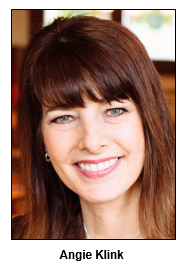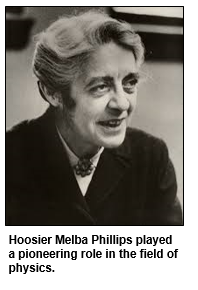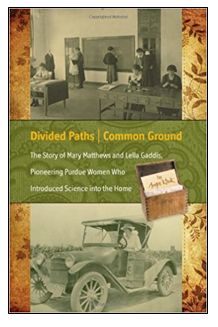Mar 8, 2019
(March 2, 2019) Women from Indiana became pioneers in sciences ranging from physics to home economics during the early and mid-1900s. But they confronted myriad challenges, and their trailblazing efforts often have been ignored.
Hoosier History Live strives to fill in this historical void as we salute Women's History Month with this encore broadcast (original air date: March 11, 2017) of a show that spotlights the innovations of - and obstacles confronted by - a physicist from southern Indiana who pioneered new theories (but whose career was stalled because of McCarthyism during the Cold War) and two women associated with Purdue University who were pioneers in "bringing science into the home." One of them traveled across the Hoosier state during the World War I era to share research with farm women.
Nelson's guests include:
Jill Weiss, digital outreach manager at the Indiana Historical Bureau. She shares insights about Melba Phillips (1907-2004), a native of Hazleton, Ind., who became an internationally acclaimed physicist, worked to improve science education and, according to Jill, "advocated for women's place at the forefront of science research." Following World War II, Phillips and other scientists organized to prevent nuclear war. She was fired from university posts, though, after being accused of advocating subversive positions.
- And Angie Klink, a Lafayette-based author and historian whose eight books include Divided Paths, Common Ground (Purdue University Press, 2011). It is a dual biography of Mary Matthews, who became the first dean of home economics at Purdue University, and Lella Gaddis, the first state leader of home demonstrations in agricultural extension.

When Matthews was initially appointed a department chair of home economics in 1912 prior to becoming Purdue's first dean of the subject, "she had little support from the men in power at Purdue," Angie writes.
Melba Phillips, the physicist, encountered enormous challenges during her long career, but she rebounded and became the first woman president of the American Association of Physics Teachers in 1966.

Phillips, who had studied under Robert Oppenheimer and went on to write two physics textbooks, was living in Petersburg, Ind., when she died at age 97. During the 1950s, she refused to testify before a subcommittee of the U.S. Senate Judiciary Committee that was investigating internal security.
Jill's blog about her is titled "Melba Phillips: Leader in Science and Conscience." Phillips also is the subject of an episode of the IHB podcast Talking Hoosier History, which Jill helps produce.

As described in our guest Angie Klink's book Divided Paths, Lella Gaddis "tooled down the country roads past Indiana cornfields" to bring the latest science about vitamins, food preservation, sanitation and other topics to farm wives. On the running board of her Model T, Gaddis propped her demonstration suitcase - and held onto it as she traveled on the rural roads.
Divided Paths also tells the story of an unconventional "lady farmer," as Virginia Claypool Meredith was called during the late 1800s and early 1900s. During our show, we also will explore her pioneering career, which included becoming the first woman on Purdue's board of trustees in 1921.
When Virginia Claypool Meredith was 33 years old in 1882, she had to take over the running of a 115-acre cattle and sheep farm near Cambridge City, Ind, when her husband died unexpectedly, according to Angie's book. "She became a nationally recognized agricultural speaker and writer."